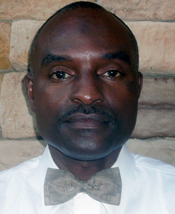South Carolina inmates making peace
By Brian E. Muhammad -Contributing Writer- | Last updated: Oct 10, 2012 - 12:20:04 PMWhat's your opinion on this article?

|
RIDGEVILLE, S.C. - Muslim inmates at the Lieber Correctional Institution scored a victory in the area of faith relations and brotherhood by averting a potentially explosive situation stemming from a disagreement between Sunni Muslims and members of the Nation of Islam over perceived sectarian differences. Prison authorities requested mediation after contention and hostilities grew between the groups.
In a September meeting, inmate coordinators from both groups met with Imam Omar Shaheed, the South Carolina state chaplain over Islamic Affairs, and N.O.I. Student Prison Reform Minister Reginald Muhammad, sent by National Student Prison Reform Minister Abdullah Muhammad to hear both sides and counsel in the way of peace.

Reginald Muhammad
|
Muslims making peace and working out differences is a high priority of the N.O.I., and Minister Farrakhan has consistently been a voice of warning against fratricide, disunity and exposing the agenda of those who benefit from it.
“The enemy is making mischief among us and what is it causing? Is it causing peace? Is it causing brotherhood? Or is it causing the shedding of blood?” asked Minister Farrakhan in a lecture called Justifiable Homicide: Black Youth in Peril.
The need for the meeting came after the negative impact of denominational differences was beginning to have on common practices such as jumu’ah prayer service—the weekly Friday congregational prayer that all Muslims are required to participate in as mandated by the Holy Qur’an, the Islamic book of scripture.
According to the N.O.I. inmate coordinator, the problem at Lieber was some inmates did not allow prayers to be performed as one group nor in the same room during the congregational service. On a recent visit to another facility, the Broad River Correctional Institution—the headquarters of the South Carolina Department of Corrections, inmates also expressed similar problems, Bro. Reginald Muhammad told The Final Call.
Lieber Correctional Institution is a maximum security prison located 38 miles outside of Charleston, S.C., and is the state’s only death row institution.
Addressing the issue of partitioning Muslims during the prayer service, Imam Shaheed agreed that regardless of differences, all Muslims should be together during jumu’ah.
According to statistics on faith traditions, nearly 30 percent of the world population are Muslims with 1.6 billion adherents and Islam is the fastest growing religion globally. For concerned Muslims outside the prison system, the timing of the problem came amid tremendous scrutiny and harassment of Muslims in America and parts of Europe. Experts say incarcerated Muslims are particularly vulnerable to the anti-Islam climate and persecution, making it more urgent for intra-faith unity, respect and understanding.
Islam has reformed and transformed countless inmates, with prominent examples like Minister Malcolm X, who under the tutelage of the N.O.I. and guidance of Elijah Muhammad, grew from being a convict to a respected world figure.
The legal battles for Muslim rights within the system date back to the unjust arrest of the Honorable Elijah Muhammad on a false draft evasion charge during World War II. Although he was older than the legal age, Mr. Muhammad served four years (1943-1946) inside the federal penitentiary in Milan, Mich.—along with many of his followers—as a conscientious objector to the war. In Message to the Blackman in America, Mr. Muhammad described the strength of Islam in his struggle with the prison system for the basic right of Muslims to practice their faith unhindered.
“In the year 1942-43, according to reports, there were nearly a hundred of my followers sentenced to prison terms from 1-5 years for refusing to take part in the war between America, Japan and Germany because of our peaceful stand and the principle belief and practice in Islam, which is peace,” he wrote.
What gets jeopardized today, if the problems between Muslims go unresolved, is the recognition of Muslims as religious and peaceful groups in the institution, said Victor C. Muhammad, the student prison reform minister for South Carolina, who was first made aware of the problems at Lieber.
“Just as they have classified other groups as gangs and would not let them meet, we have not been classified as such, but it could be a potential and possibility,” he said.
The willingness of the Muslim inmates to meet and dialogue about their issues while in an often hostile environment should be commended. The inmate coordinators committed to a follow-up meeting among themselves to further solidify agreement to exercise mutual respect as Muslims.
INSIDE STORIES AND REVIEWS
-
-
About Harriett ... and the Negro Hollywood Road Show
By Rabiah Muhammad, Guest Columnist » Full Story -
Skepticism greets Jay-Z, NFL talk of inspiring change
By Bryan 18X Crawford and Richard B. Muhammad The Final Call Newspaper @TheFinalCall » Full Story -
The painful problem of Black girls and suicide
By Charlene Muhammad -National Correspondent- » Full Story -
Exploitation of Innocence - Report: Perceptions, policies hurting Black girls
By Charlene Muhammad -National Correspondent- » Full Story -
Big Ballin: Big ideas fuel a father’s Big Baller Brand and brash business sense
By Bryan Crawford -Contributing Writer- » Full Story






 Click Here Stay Connected!
Click Here Stay Connected!








